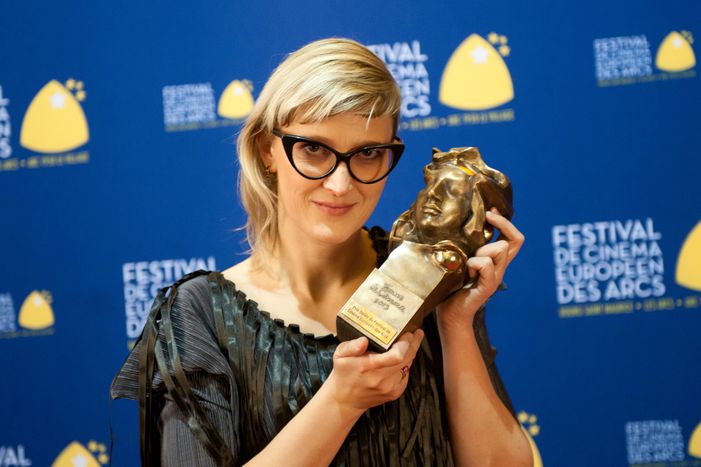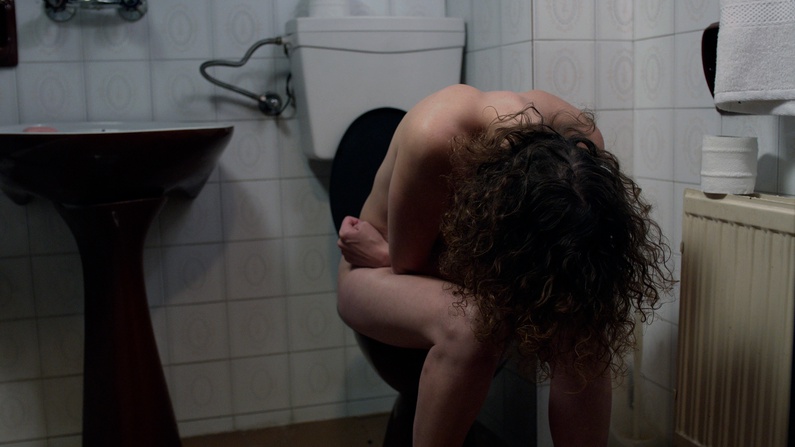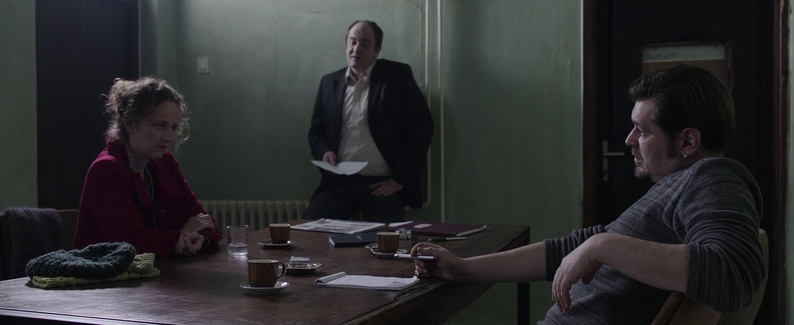
Jasmila Zbanic : "Bosnian pain can be felt by anyone"
Published on
Jasmila Zbanic is a film director very attached to her country’s history. She wishes to share its pains and scars. Her goal is also to show Bosnia from different perspectives, and through different stories. Presenting the intense and beautiful For those who can tell no tales, she tells Cafébabel about filming atmospheres and emotions, all conveyed by her country’s tragic past.
"I wanted to make something that would help me define my country twenty years after the war", explains Jasmila Zbanic. Then a friend told her about a play by an Australian playwright and actress, Kym Vercoe, inspired by her own experience in a Bosnian city named Visegrad. Famous for its bridge and architecture, the place reveals itself to be a symbol of the atrocities perpetrated during the war.
cafébabel : What’s your personal relationship to the city of Visegrad?
Jasmila Zbanic : I heard what happened in Visegrad when the war started in 1992, but I was there just once before the war, never after. It is just an hour and a half ago from Sarajevo but it feels more far away than Paris to me. When we decided to make this film, it was also a sort of self exploration; it made me wonder why I also in a way denied that this city was what it was. When you live in Bosnia, there are so many sad stories that somehow you have to close your ears and your eyes in order to live and go on. It was a real challenge for me to make this film, because of the way people would react. I was of course afraid.
 cafébabel : The atmosphere of the movie is really tense… Is it really the atmosphere one feels in Visegrad?
cafébabel : The atmosphere of the movie is really tense… Is it really the atmosphere one feels in Visegrad?
Jasmila Zbanic : It is. You know, we travelled several times before the shooting. I thought it was because I knew what had happened, but later I met a lot of people who didn’t know and they said they had the same feeling. These silences, the no talking, put such a big pressure on the whole city.
Shooting the poetic power
cafébabel : But at the same time it does have a poetic power…
Jasmila Zbanic : Yes, that’s why I was attracted to it. This bridge is ambivalent because it is beautiful in one way but it is also very scary. The river is beautiful but when you know that plenty of dead bodies were in it, then you have a different emotion. And I liked that it’s ambivalent, that you are never certain of the beauty of things.
cafébabel : How were the filming conditions there?
Jasmila Zbanic : I had already made a film in 2006 about mass rapes (Grbavica, who won the Golden Bear at the 56th Berlin International Film Festival) and politicians said in every paper that I was against Serbs because I said war crimes happened. When organizing the shooting with the crew, we talked to local people and they said there was no way we could shoot considering the topic, that it wasn’t safe. Fortunately, a friend of mine, a Serbian director, agreed to come with us, and somehow it worked.
For those who can tell no tales, trailer
cafébabel : When did you decide to make a movie out of Kym Vercoe’s play?
Jasmila Zbanic : In the year 2012, it was 20 years since the beginning of the war (I was 17 when it started) and I was in a weird position of not being able to define it, to put it in a box somehow and say “that’s it”. So I wanted to make something which would help me figure out what my country looks like now. I was searching for a story that would deal with this topic. By chance, I saw Kym Vercoe’s theater play and found my story. I was seduced because she was talking about emotions, how the country is beautiful and wonderful on the surface, but how many things are still going on. And that is also my feeling while living in Bosnia.
cafébabel : Did it surprise you that someone from so far away as Australia could be so interested in Bosnia?
Jasmila Zbanic : Yes of course. Kym (who plays her own part in the movie) discovered Visegrad by accident, when travelling to the Balkans. She decided to visit the city and felt something very deep. It tells us that all human beings are the same. It doesn’t matter what nationality you are, you could still feel the same basic emotions. It is not only Bosnian pain; it can be felt by anyone.
A whole system covering up crimes
cafébabel : Are war crimes still a big taboo in your country?
Jasmila Zbanic : The fact is that people who were running the war had nothing before and are now multi millionaires, so of course they are still trying not to open this box. They are trying to push fear and hatred amongst people so that they don’t think of them as profiteers. The taboo comes from these people who still have power in politics, media, education and police; they are still integrated very much in the society.
 cafébabel : The police cars wandering in the streets of Visegrad clearly remind us of this political pressure…
cafébabel : The police cars wandering in the streets of Visegrad clearly remind us of this political pressure…
Jasmila Zbanic : Yes, it is a whole system covering up these crimes. It is such a small city, and when they have foreigners coming, they think of them as investigators for international tribunals, and immediately want to scare them away. What happened is that a lot of war criminals stayed during the war in police structures and in tribunals. We often think that when the war is over, all war criminals are gone, but the fact is that just a few are tried, and a lot stay and live a normal life.
cafébabel : Is it a film on memory duty?
Jasmila Zbanic : For me, the main impulse for the film was Kym’s actions, the way she reacted when she learned about the crimes. I think we are very often taught to be passive in life, but small actions can provoke chain reactions. It led to her theater play and to my movie for instance. The story is travelling and people learn about the topic...
cafébabel : What does it bring you personally to make films about your country?
Jasmila Zbanic : I chose to make movies because of a passion or obsession that I had about certain emotions and subjects. And to me, there’s no point in making a movie if I am exactly the same at the beginning and at the end. Films do change me, especially when I work with a team, and when every member adds its view to the project. I have a strong European team, and people from different countries working together provides such a good energy!



